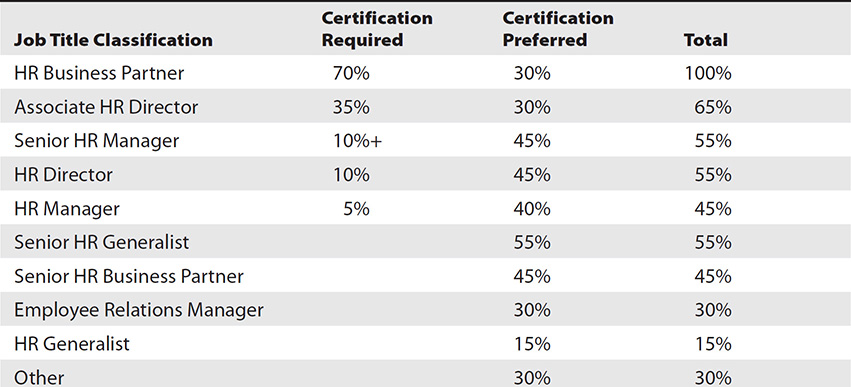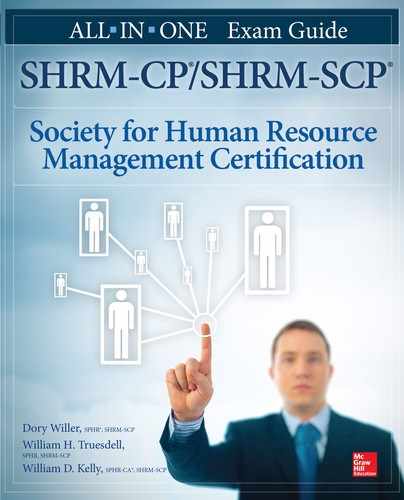CHAPTER 1
Human Resource Certification
The skills and abilities that a human resources (HR) professional uses to produce desired results require a mastery of sorts. Mastery of any profession will involve a continuous career-long commitment to learning, and that is a foundational truth within the human resources profession. HR has been, and continues to be, an evolving component of an organization because its basic focus is on the people, otherwise referred to as the human capital of an organization. The constant changes and outside influences on an organization’s workforce increase the demands on HR professionals. HR professionals today walk a tight line and must master the art of staying two steps ahead while having one foot firmly planted in the present. Today’s HR department needs to be perceived as a strategic player in an organization, positioning itself with developing business approaches while solving problems and being more than a cost center.
Professional Human Resources Management Certification
Certifications demonstrate for professionals what we do and why it matters. Credentialing as an HR professional demonstrates to your colleagues and your organization that you are committed to a higher standard and ethic and dedicated to the HR profession. When you achieve your HR credential, it signals your mastery of core practices and principles in HR management, raising the confidence of an employer and your peers in your abilities. Because the HR profession is constantly changing and evolving, it is important for HR professionals to constantly update their HR competencies and knowledge. Achieving certification and recertification is a good method to do so.
A professional certification should not be confused with a certificate program. Professional certifications are based on work experience and education along with recertification requirements. Certificate programs do not require work experience or an educational component, nor do they require recertification. Competency-based certifications address a critical need in our global marketplace because employers expect more today from their internal experts, and the HR profession must be ready to meet those expectations.
Benefits of Certification
Earning an HR credential adds a level of recognition as an expert in the HR profession. This certification is a distinction that sets you apart in the profession, indicating you have a high level of knowledge and skills. It adds to your career value and to the organization you work in. Your HR certification could mean the difference between you and your competition. In fact, 96 percent of employers say that an HR-certified candidate applying for a job would have an advantage over a noncertified candidate. And HR professionals who hold certifications tend to make more money than their peers who do not.1 According to PayScale Human Capital, this pattern is true for all industries and metropolitan areas in the United States. HR certification is becoming an important means for employers to recognize HR expertise and for HR professionals to increase their value and worth.
Earning an HR credential can help you:
• Boost your confidence
• Create recognition for you as an HR expert
• Master expert knowledge for the HR profession
• Protect your organization from risk by knowing regulatory compliance
• Stand out from other HR candidates in job searches and promotions
• Broaden your perspective in the HR field
• Keep up with HR innovations, developments, and legislative/law changes
• Demonstrate your commitment to the HR profession
Many organizations, including a number of Fortune 500 organizations, now require or prefer HR certification for their new HR hires or for internal promotions. A May 2014 study from Software Advice, Inc., called “What Employers Are Looking for in HR Positions”2 reveals that employers will be increasingly demanding certification for their job candidates. The study found the HR certification preferences shown in Table 1-1, broken down by job title.

Table 1-1 HR Certification Specifications by Job Title
This survey suggests that certification will be essential for any professional-level HR job candidate. If an individual wants to be considered for a senior-level HR position, then certification is nearly an absolute requirement. Those expectations will be further solidified as time goes on.
HR Certification Organizations
As of 2018, there are two certifying organizations for HR professionals to receive their certifications from, the HR Certification Institute (HRCI) which is accredited, and the Society for Human Resource Management (SHRM). Determining whether to pursue the SHRM Certified Professional (SHRM-CP) or SHRM Senior Certified Profession (SHRM-SCP) or the HRCI credentials is an important decision. Both organizations’ certifications test knowledge that the profession requires as their baseline. While they both test knowledge, the SHRM certifications focus as much as 50 percent of their test content on applying that knowledge and the importance of behavioral competency even as they include a more expansive global perspective. The eligibility requirements are more inclusive (as of this writing) for the SHRM exams, and the cost is slightly less than the HRCI exams. They both have their merits, which is why we hold both certifications.
The HR Certification Institute
The HR Certification Institute (www.hrci.org) was established in 1976 as an internationally recognized certifying organization for the human resource profession. Its mission is to develop and deliver the highest-quality certification programs that validate mastery in the field of human resource management and contribute to the continued improvement of individual and organizational performance. More than 145,000 HR professionals in more than 100 countries are certified. Until 2015, HRCI was the only certifying organization for the HR profession and as of this writing is the only accredited certifying organization.
HRCI exists to enhance the professionalism of the HR profession with its various certification processes. The institute is a nonprofit (501)(c)(3)3 separate organization, an IRS designation, from the Society of Human Resource Management, which is a (510)(c)(6)4 organization. HRCI was accredited by the National Commission for Certifying Agencies (NCCA) in 2008.
HRCI’s Body of Knowledge (BoK) is a complete set of knowledge and responsibilities statements required to successfully understand and perform generalist HR-related duties associated with each of its eight credentials, Associate Professional in Human Resources (aPHR), Professional in Human Resources (PHR), Professional in Human Resources, California (PHRca), Senior Professional in Human Resources (SPHR), Global Professional in Human Resources (GPHR), Associate Professional in Human Resources, International (aPHRi), Professional in Human Resources, International (PHRi), and Senior Professional in Human Resources, International (SPHRi). The BoK is periodically updated, typically every 5 to 7 years, to ensure it is consistent with and reflects current practices in the HR field. Our book, PHR/SPHR Professional in Human Resources Certification All-in-One Exam Guide,5 provides in-depth preparation for the PHR and SPHR exams.
The Society for Human Resource Management
For more than 65 years, the Society for Human Resource Management (www.shrm.org) has served the human resource profession and HR professionals worldwide. Founded in 1948, SHRM is the world’s largest HR membership organization devoted to human resource management. Representing more than 275,000 members in more than 160 countries, SHRM is the leading provider of resources to serve the needs of HR professionals and advance the professional practice of human resource management. SHRM has more than 575 affiliated chapters within the United States and subsidiary offices in China, India, and United Arab Emirates.
HR professionals look to SHRM for resources to help them do their jobs, progress their careers, and partner with government and public and private industry. SHRM focuses on advancing the HR profession as a whole, ensuring that as business needs involving human capital evolve, HR evolves to meet those needs. That was the driving force behind the development of a Body of Competency and Knowledge (BoCK) supporting next-generation credentials in the HR field: the SHRM Certified Professional and the SHRM Senior Certified Professional certifications.
SHRM has a commitment to developing the HR profession globally; SHRM provides resources, global best practices, and a network of more than 9,000 members in more than 160 countries. In addition to delivering certification preparation courses and other educational products and services to members around the world, SHRM partners with volunteers in select countries to lead member forums and encourage local networking among members. SHRM is an active member of the North American Human Resource Management Association (NAHRMA) and the World Federation of People Management Associations (WFPMA) and currently serves as the secretariat for both organizations.
Chapter Review
The number of HR professionals needed in the coming years to manage the human capital in organizations will continue to expand. The U.S. Bureau of Labor Statistics anticipates that the number of HR manager positions will grow 13 percent and will grow 8 percent for HR specialist positions by the year 2022.6 In addition, employer selection systems will increasingly use certification as an employment screening element. Whether you choose to obtain a certification from SHRM or HRCI, or both, is not going to be as relevant as when you will achieve your credential. The value of certification is being recognized in all levels of the organization and throughout the HR profession. SHRM’s new Body of Competency and Knowledge (BoCK) and certification exams raise the stakes for the professional by requiring exam takers to demonstrate an ability to apply the knowledge they know, not simply identify what they know. This certainly moves the mark toward “art” and away from “science” with regard to effectiveness. We’re confident that adding the SHRM certification to your résumé will draw special attention to your achievement and to the time and discipline involved in attaining this professional goal.
References
1. PayScale Human Capital research report, “The Market Value of PHR and SPHR Certifications,” http://resources.payscale.com (search on title of report).
2. Osterhaus, Erin. “What Employers Are Looking for in HR Positions,” (The New Talent Times, May 27, 2014), http://new-talent-times.softwareadvice.com/what-employers-look-for-hr-jobs-0514/.
3. To be tax-exempt under section 501(c)(3) of the Internal Revenue Code, an organization must be organized and operated exclusively for exempt purposes set forth in section 501(c)(3), and none of its earnings may inure to any private shareholder or individual. In addition, it may not be an action organization, i.e., it may not attempt to influence legislation as a substantial part of its activities and it may not participate in any campaign activity for or against political candidates. Organizations described in section 501(c)(3) are commonly referred to as charitable organizations. Organizations described in section 501(c)(3), other than testing for public safety organizations, are eligible to receive tax-deductible contributions in accordance with Code section 170. IRS Code (https://www.irs.gov/charities-non-profits/charitable-organizations/exemption-requirements-section-501-c-3-organizations).
4. IRC 501(c)(6) provides for exemption of business leagues, chambers of commerce, real estate boards, boards of trade, and professional football leagues (whether or not administering a pension fund for football players), which are not organized for profit and no part of the net earnings of which insures to the benefit of any private shareholder or individual. IRS Code (https://www.irs.gov/pub/irs-tege/eotopick03.pdf).
5. Willer, Dory, and William H. Truesdell. PHR/SPHR Professional in Human Resources Certification All-in-One Exam Guide (McGraw-Hill Education, 2015).
6. Bureau of Labor Statistics, U.S. Department of Labor, Occupational Outlook Handbook, 2014-2015 Edition, Human Resources Managers, www.bls.gov/ooh/management/human-resources-managers.htm.
